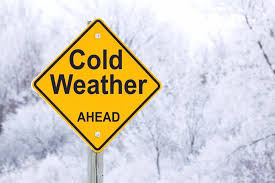 As autumn quickly gives way to winter, your air compressor system may face some operational challenges – especially if you experience below-freezing temperatures in your region. Temperatures below freezing can have many adverse effects on compressed air equipment. One of the primary reasons that compressed air systems may face trouble in the winter is frozen condensate. This can cause short-term and long-lasting damage to your equipment such as freezing control lines, cracking of heat exchangers, and/or frozen drain valves. Ideally, your air compressor room should not drop below 40° Fahrenheit, but when it does, you need to be aware of the effects that cold ambient conditions can have on your compressed air equipment.
As autumn quickly gives way to winter, your air compressor system may face some operational challenges – especially if you experience below-freezing temperatures in your region. Temperatures below freezing can have many adverse effects on compressed air equipment. One of the primary reasons that compressed air systems may face trouble in the winter is frozen condensate. This can cause short-term and long-lasting damage to your equipment such as freezing control lines, cracking of heat exchangers, and/or frozen drain valves. Ideally, your air compressor room should not drop below 40° Fahrenheit, but when it does, you need to be aware of the effects that cold ambient conditions can have on your compressed air equipment.
Use these tips to preserve the integrity of your compressed air system and help you ensure it operates safely and efficiently in the cold.
- Check condensate drains throughout your system for proper operation. Condensate is a common occurrence in air compressors. It forms in the system and settles in low places. In the winter, unaddressed condensate can freeze and burst pipes. Install heat tape on anything that is exposed. Also, make sure your compressed air dryer and compressed air filters have been serviced and are operating correctly. Their job is to remove the condensate from your system.
- Heat your compressor. If your equipment is outside, make sure you can protect it from the wind. You can use floodlights or heat lamps to keep your controls from freezing. If your equipment is inside, check insulated areas and make sure that the heat is staying inside and cold is staying outside. If your compressor is in an unheated room, a small space heater can offer additional warmth. Also, check any weather stripping and replace areas that are worn out and not working properly.
- Check the intake for your air compressor. If it’s exposed to the outside elements, your inlet air filter can be damaged from ice and snow.
- Check your fluid levels often. Keep in mind that the system may burn through more oil as it heats up at the beginning of the workday and that you may need to top off the oil more frequently than usual.
- Have your system properly maintained. Regular service and routine maintenance are essential requirements for an efficient compressed air system. This is true year-round, but a drop in weather can cause unforeseen issues.

You must be logged in to post a comment.